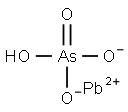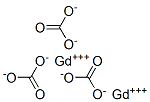LEAD CARBONATE
- CAS NO.:598-63-0
- Empirical Formula: CO3Pb
- Molecular Weight: 267.21
- MDL number: MFCD00064631
- EINECS: 209-943-4
- SAFETY DATA SHEET (SDS)
- Update Date: 2024-12-18 14:08:57

What is LEAD CARBONATE?
Chemical properties
colorless ortho-rhomb crystal(s); made by adding CO2 to a cold dilute solution of lead acetate; many uses such as a catalyst for organic reactions, in high temp greases, as a photoconductor in electrophotography [KIR78]
Chemical properties
Lead carbonate forms colorless orthorhombic crystals; it decomposes at about 315 °C. It is nearly insoluble in cold water (0.00011 g/100 mL at 20 °C), but is transformed in hot water to the basic carbonate, 2PbCO3·Pb(OH)2. Lead carbonate is soluble in acids and alkalies, but insoluble in alcohol and ammonia.
The Uses of LEAD CARBONATE
Lead carbonate (PbCO3) is found in nature as cerussite. It can also be produced in the laboratory by reacting sodium carbonate with chlorine. It is a crystalline poison that was, and to a lesser extent still is, used as a pigment in white house paints.
The Uses of LEAD CARBONATE
Preparation of lead standard solutions
The Uses of LEAD CARBONATE
Lead carbonate has a wide range of applications. It catalyzes the polymerization of formaldehyde to high molecular weight crystalline poly(oxymethylene) products. It is used in poly(vinyl chloride) friction liners for pulleys on drive cables of hoisting engines. To improve the bond of polychloroprene to metals in wire-reinforced hoses, 10–25 parts of lead carbonate are used in the elastomer. Lead carbonate is used as a component of high pressure lubricating greases; as a catalyst in the curing of moldable thermosetting silicone resins; as a coating on vinyl chloride polymers to improve their dielectric properties; as a component of corrosion-resistant, dispersion-strengthened grids in lead–acid storage batteries; as a photoconductor for electrophotography; as a coating on heatsensitive sheets for thermographic copying; as a component of a lubricantstabilizer for poly(vinyl chloride); as a component in the manufacture of thermistors, and as a component in slip-preventing waxes for steel cables to provide higher wear resistance.
Definition
A naturally occurring form of lead(II) carbonate that is an important lead ore. It forms orthorhombic crystals and is often found together with galena (PbS).
Definition
cerussite: An ore of lead consistingof lead carbonate, PbCO3. It is usuallyof secondary origin, formed by theweathering of galena. Pure cerussiteis white but the mineral may be grey due to the presence of impurities. Itforms well-shaped orthorhombiccrystals. It occurs in the USA, Spain,and SW Africa.
Production Methods
Lead carbonate is prepared by passing CO2 into a cold dilute solution of lead acetate, or by shaking a suspension of a lead salt less soluble than the carbonate with ammonium carbonate at a low temperature to avoid formation of basic lead carbonate.
Properties of LEAD CARBONATE
| Melting point: | 399-401°C (dec.) |
| Density | 6.6 g/cm3 |
| refractive index | 2.08 |
| storage temp. | Store below +30°C. |
| solubility | insoluble in H2O |
| form | Powder |
| color | White |
| PH | 5.8 (50g/l, H2O, 20℃)(slurry) |
| Water Solubility | Soluble in acid and alkali. Insoluble in water, alcohol and ammonia. |
| Dielectric constant | 18.1(16.0℃) |
| Stability: | Stable. Incompatible with strong acids, strong oxidizing agents. |
| CAS DataBase Reference | 598-63-0(CAS DataBase Reference) |
| EPA Substance Registry System | Lead(II) carbonate (598-63-0) |
Safety information for LEAD CARBONATE
| Signal word | Danger |
| Pictogram(s) |
 Exclamation Mark Irritant GHS07  Health Hazard GHS08  Environment GHS09 |
| GHS Hazard Statements |
H373:Specific target organ toxicity, repeated exposure H410:Hazardous to the aquatic environment, long-term hazard |
| Precautionary Statement Codes |
P202:Do not handle until all safety precautions have been read and understood. P260:Do not breathe dust/fume/gas/mist/vapours/spray. P273:Avoid release to the environment. P301+P312:IF SWALLOWED: call a POISON CENTER or doctor/physician IF you feel unwell. P308+P313:IF exposed or concerned: Get medical advice/attention. |
Computed Descriptors for LEAD CARBONATE
LEAD CARBONATE manufacturer
JSK Chemicals
Nithyasri Chemicals (APURVA CHEMICALS)
ARRAKIS INDUSTRIES LLP
New Products
(S)-3-Aminobutanenitrile hydrochloride 4-Methylphenylacetic acid N-Boc-D-alaninol N-BOC-D/L-ALANINOL Tert-butyl bis(2-chloroethyl)carbamate 3-Morpholino-1-(4-nitrophenyl)-5,6-dihydropyridin- 2(1H)-one Furan-2,5-Dicarboxylic Acid Tropic acid 1-Bromo-3,5-Di-Tert-Butylbenzene S-2-CHLORO PROPIONIC ACID ETHYL ISOCYANOACETATE 2-Bromo-1,3-Bis(Dimethylamino)Trimethinium Hexafluorophosphate 4-IODO BENZOIC ACID 3-NITRO-2-METHYL ANILINE 1-(2,4-DICHLOROPHENYL) ETHANAMINE (2-Hydroxyphenyl)acetonitrile 4-Bromopyrazole 2-(Cyanocyclohexyl)acetic acid 4-methoxy-3,5-dinitropyridine 1-(4-(aminomethyl)benzyl)urea hydrochloride 2-aminopropyl benzoate hydrochloride diethyl 2-(2-((tertbutoxycarbonyl)amino) ethyl)malonate tert-butyl 4- (ureidomethyl)benzylcarbamate Ethyl-2-chloro((4-methoxyphenyl)hydrazono)acetateRelated products of tetrahydrofuran








You may like
-
 Lead(II) carbonate CAS 598-63-0View Details
Lead(II) carbonate CAS 598-63-0View Details
598-63-0 -
 Lead(II) carbonate CAS 598-63-0View Details
Lead(II) carbonate CAS 598-63-0View Details
598-63-0 -
 Lead(II) carbonate, For analysis ACS CAS 598-63-0View Details
Lead(II) carbonate, For analysis ACS CAS 598-63-0View Details
598-63-0 -
 Lead(II) carbonate, For analysis ACS CAS 598-63-0View Details
Lead(II) carbonate, For analysis ACS CAS 598-63-0View Details
598-63-0 -
 Lead(II) carbonate CAS 598-63-0View Details
Lead(II) carbonate CAS 598-63-0View Details
598-63-0 -
 Lead(II) carbonate CAS 598-63-0View Details
Lead(II) carbonate CAS 598-63-0View Details
598-63-0 -
 Lead Carbonate CAS 598-63-0View Details
Lead Carbonate CAS 598-63-0View Details
598-63-0 -
 Lead carbonate 98% CAS 598-63-0View Details
Lead carbonate 98% CAS 598-63-0View Details
598-63-0